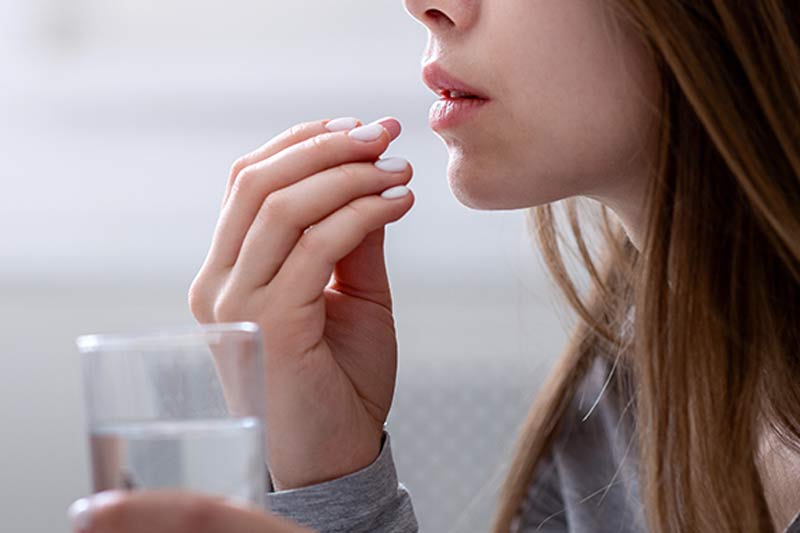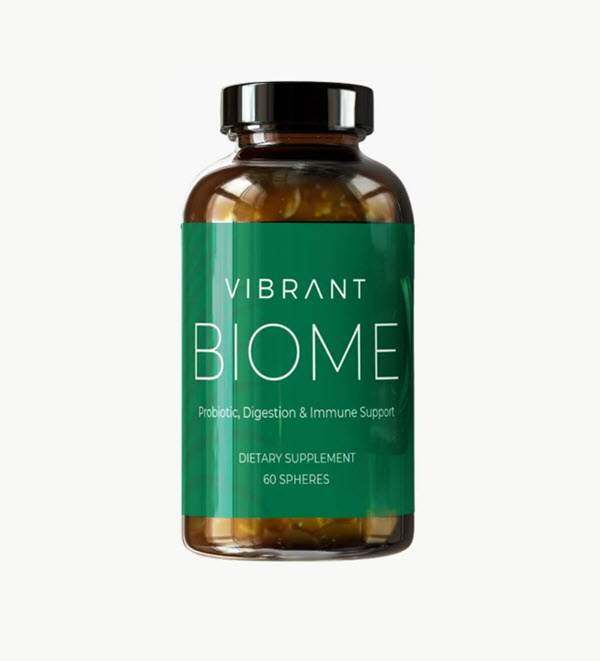Gut health is intricately connected to your skin and impacts its immune function, resilience to UV exposure, and self-healing capacity. An imbalanced gut microbiome can trigger or worsen inflammatory skin conditions, including acne, eczema, and psoriasis.
This article explores how gut health affects the skin and offers practical ways to improve both gastrointestinal and skin health.

How Does the Gut Communicate with the Skin?
The gastrointestinal microbiota is closely linked to skin flora through what scientists call the gut-brain-skin axis. This bidirectional relationship means that any disruption in the gut microbial balance (dysbiosis) can directly affect the skin, leading to hormonal imbalances and skin inflammation.
The gut also communicates with the skin through neurotransmitters formed in the enteric nervous system (ENS), a vast neural network located in the walls of the gastrointestinal tract. The stomach acts as our “second brain,” modulating hormonal and immune responses that often manifest in skin conditions.
How Does the Gut Affect the Skin?
The gut influences skin health through the following mechanisms:
- Defends against harmful microbes – A healthy gut microbiome acts as a natural barrier, preventing harmful bacteria and viruses from entering the bloodstream and causing skin infections or irritation.
- Reduces inflammation – A diverse and balanced gut flora has powerful anti-inflammatory effects, lowering the risk of chronic inflammation that can trigger skin flare-ups.
- Boosts immune protection – Scientists have discovered that over half of the body’s antibody-producing cells are in the intestinal mucosa. These antibodies defend the skin from pathogens and support barrier integrity.
- Regulates hormones – The gut biome influences hormones, including estrogen, progesterone, and cortisol. Microbiome imbalances can disrupt hormonal activity, contributing to excess sebum production and hormonal acne.
- Modulates neurotransmitter levels – Gut bacteria influence the production of serotonin, a neurotransmitter that affects skin pigmentation and promotes skin healing, according to new studies.
- Nourishes the skin – A healthy gut facilitates nutrient absorption, enhancing the quality of skin, nails, and hair. Gut conditions like IBD or SIBO can provoke nutrient malabsorption, leading to dryness, slower wound healing, hyperpigmentation, and acne.
- Supports the skin barrier– Gut bacteria produce short-chain fatty acids (SCFAs) like butyrate, a postbiotic that strengthens the skin barrier and alleviates eczema symptoms. Studies show that infants with eczema have reduced levels of butyrate-producing bacteria such as Eubacterium and Anaerostipes.
Note: Learn how to improve nutrient absorption with diet, gut-supporting supplements, and lifestyle changes.
How Does the Skin Affect the Gut?
The skin and gut are in constant communication, often reflecting each other’s health. Changes in the makeup of the skin flora can affect gut health, though more research is needed to fully understand this connection.
A 2019 study found that narrow band ultraviolet (UVB) light therapy used to increase vitamin D levels and treat inflammatory skin conditions also promoted a more diverse and balanced gut microbiome.
Factors Affecting the Gut Microbiome and Skin
After the first three years of life, the gut microbiome becomes relatively stable, but many factors continue to influence it throughout adulthood. Understanding how these factors affect your gut and skin health can help you establish healthier, long-lasting habits.
Genetics and Early Life Experiences
Genetics impact your microbiome, making you more likely to develop some gastrointestinal issues and influencing how your body responds to fiber, fats, and probiotics. Your genes also affect digestive enzyme production and gut lining integrity.
The mode of delivery (vaginal vs. Cesarean) is also crucial for developing a healthy, thriving gut flora. Studies show that some autoimmune and metabolic disorders may be linked to gut microbiome imbalances in babies born by C-section.
Researchers have also found that breastfeeding supports microbial and immune development in infants, with potential lifelong health consequences.
Age
According to research, aging can decrease microbial diversity and provoke changes in bacterial composition, triggering metabolic changes and increasing the risk of gut-related problems. Typical examples include digestive issues, constipation, and weakened immunity.
As we get older, the skin starts to sag and wrinkle, losing its natural elasticity due to decreased collagen and elastin production. Skin-rejuvenating treatments and products can be an effective anti-aging ally, particularly those with microbiome-friendly ingredients like probiotics and barrier-supporting ingredients like ceramides and niacinamide.
Diet
Whole, nutrient-dense food contains essential vitamins, minerals, and antioxidants that nourish the skin and support gut function. A well-balanced, fiber-rich diet promotes a thriving microbiome, reduces inflammation, prevents dysbiosis, and enhances the immune system.
On the other hand, processed food contains additives, artificial flavors, and trans fats that can worsen inflammatory conditions, leading to skin flare-ups, digestive discomfort, and nutrient malabsorption.
Stress
Stress can alter the composition, diversity, and function of gut microbiota. It may also increase intestinal permeability and contribute to leaky gut syndrome, where toxins enter the bloodstream, disrupting skin flora and triggering conditions like acne, eczema, psoriasis, and rosacea.
The connection between stress and skin or stress and stomach is complex, involving increased inflammation, weakened immunity, and a disruption of the microbial balance. The body’s fight-or-flight response also heightens sensitivity, often leading to breakouts and digestive issues such as constipation, diarrhea, or IBS.
Antibiotics

Antibiotics reduce or eliminate infection-causing bacteria, preventing severe and potentially fatal health complications. Despite their clear medical benefits, antibiotics can harm the beneficial bacteria found in the gastrointestinal tract. Subsequently, antibiotic use can reduce microbial diversity.
Studies have shown the microbiome’s recovery from antibiotics may take more than two years. In some cases, microbial diversity can be permanently damaged, which increases the risk of long-term gut problems.
Consult a trusted dermatologist who will correctly diagnose eczema and avoid unnecessary antibiotic treatments. Antibiotics should be used only when truly needed and paired with a probiotic to protect the microbiome.
Hormonal Imbalance
Gut health and hormones are connected through the gut-brain axis. High cortisol levels can increase gut inflammation and reduce beneficial bacteria. Estrogen imbalances, meanwhile, can alter the estrobolome, a group of gut bacteria that metabolize the body’s circulating estrogen.
Hormonal imbalances can also signal an underlying gut dysfunction or dysbiosis. Gut bacteria influence hormone activity, influencing estrogen metabolism, the release of neurotransmitters like serotonin and dopamine, and the production of GABA, which helps regulate mood and stress responses.
Regularly monitoring hormone values, especially during pregnancy, breastfeeding, perimenopause, or menopause, can prevent potential hormone-triggered skin problems, such as acne.
Environmental Microbes
Contact with a variety of environmental microbes from soil, air, water, plants, and animals can diversify the microbiome and increase immunity to harmful pollutants. Overly sanitized environments reduce microbial exposure, increasing the risk of allergies, inflammatory skin conditions, and autoimmune diseases.
A healthy, resilient microbiome protects against external stressors and minimizes oxidative stress and skin pollution, preventing premature aging and inflammatory gut and skin conditions.
Note: Read more about anti-pollution skin care to strengthen the barrier and keep the skin youthfully radiant.
Lifestyle Choices
Your daily habits directly affect digestion, metabolism, skin healing, and how quickly your skin ages. The most common lifestyle factors that influence both gut and skin health include:
- Sleep – The World Health Organization (WHO) recommends 7 to 9 hours of uninterrupted sleep for adults. Poor sleep habits increase cortisol levels, promote inflammation, and negatively impact overall health.
- Exercise – Regular, low-intensity workouts improve digestion, enhance circulation, support gut motility, and boost skin tone. Sweating also helps flush out toxins and unclog pores.
- Water intake – Staying well-hydrated aids digestion, supports regular bowel movements, and keeps the skin fresh, plump, and radiant.
- Smoking and alcohol – These habits increase inflammation, disrupt gut microbiota, damage the intestinal lining, and dehydrate the skin, contributing to premature aging, dullness, and wrinkles.
Linked Gut and Skin Conditions
Research shows that an impaired gut and/or skin microbiome can disrupt the immune response and increase inflammation, triggering the development or progression of the following conditions:
- Atopic dermatitis
- Eczema
- Psoriasis
- Rosacea
- Acne vulgaris
- Dandruff
- Vitiligo
- Hives (i.e., urticaria)
- Gut dysbiosis
- Leaky gut
- Inflammatory bowel disease
- Celiac disease
- Skin dysbiosis
- Hair loss (e.g., alopecia areata)
- Skin cancer
Studies show that psoriasis patients frequently suffer from gut-related issues, such as inflammatory bowel disease (IBD), gut dysbiosis, and a deficiency of vitamin D or selenium. A connection has also been discovered between inflammatory bowel disease and atopic dermatitis.
More Signs of Compromised Gut Health
These are some health issues that may indicate an underlying gut issue:
- Unexplained weight loss
- Sudden weight gain
- Irritant contact dermatitis
- Food intolerance
- Unhealthy cravings
- Bloating
- Constipation
- Diarrhea
- Nausea
- Abdominal pain
- Undigested food in stool
- Heartburn or acid reflux
- Bad breath
- Mood swings
- Brain fog
- Fatigue
- Migraines
- Sleep disturbances
- Frequent colds
- Inflammation or joint pain
How to Improve Gut and Skin Health
Since changes in the composition of intestinal microbiota affect the skin, it is crucial to learn how to improve gut health to maintain a youthful, radiant complexion.
Here are the most effective methods to do so.
Improve Your Diet
A well-balanced diet can significantly enhance your immune system, improve digestion, reduce inflammation, and soothe skin problems. Prioritize fresh, seasonal foods rich in fiber and probiotics.
Fiber-rich foods are excellent sources of prebiotics, which feed beneficial bacteria and promote gut microbial diversity. Examples include garlic, onions, artichokes, leeks, and asparagus.
Probiotic foods contain live beneficial bacteria that sustain a healthy flora. Examples include fermented products and vegetables like kefir, yogurt, sauerkraut, kimchi, tempeh, and pickles.
Research has revealed that consuming lots of added sugars, gluten, and alcohol disrupts the microbiome and triggers the overgrowth of E. coli in the intestines. Studies have also shown the correlation between gut dysbiosis and psoriasis flare-ups, indicating that the diet is pivotal in reducing inflammation and restoring the balance of the gut microbiota.
Note: Discover the best foods for skin and gut health.
Take Probiotics, Prebiotics, and Postbiotics
Prebiotics are non-digestible fibers that nourish good bacteria and promote a homogenous microbial environment in the GI tract. They also strengthen the immune response, decrease pathogenic bacteria and allergy risks, and enhance gut barrier function by stimulating short-chain fatty acid (SCFA) production.
Probiotics contain live microorganisms that can help inhibit the growth of harmful bacteria, partly through the production of antimicrobial peptides. They also bind to the cells of the intestinal lining to prevent external pathogens from invading the body. This study shows that probiotics reduce skin sensitivity and strengthen the barrier, and other research indicates that they lower levels of inflammatory markers and alleviate symptoms of atopic dermatitis.
Postbiotics are metabolic byproducts of fermented prebiotics with short-chain fatty acids, vitamins, enzymes, and peptides. They lower inflammation, relieve constipation and diarrhea, hinder microbial overgrowth, and enhance immune response.
Synbiotics are dietary supplements that combine prebiotics, probiotics, and postbiotics to fend off harmful bacteria, encourage the production of beneficial microorganisms, aid nutrient absorption, and prevent allergies.
Our health experts recommend Vibrant Biome, a probiotic blend that supports digestion, immunity, and microbial diversity while alleviating skin redness and inflammation.

Microbiome Skin Care
A holistic approach focuses on taking care of your skin from the inside out, promoting a healthy, thriving gut flora to achieve long-term beauty goals.
Holistic dermatologists prioritize microbiome skincare to treat inflammatory conditions like acne, rosacea, or psoriasis. These treatments contain synbiotics that foster a healthy skin ecosystem, boost the skin’s natural defenses, and create an optimal microbial environment.
Note: Our experts have designed a microbiome-supporting skincare line that you can purchase online.
Conclusion
The skin and gut microflora form the frontline of the body’s defenses, protecting us against unwanted germs, pollutants, external threats, and harmful bacteria. Through the brain-gut-skin axis, imbalances in gut health trigger inflammatory and immune responses that manifest on the skin. By prioritizing gut health, you can improve the skin’s resilience, promote a clear complexion, and reduce chronic inflammation.
Contact our skin experts to discover effective holistic strategies for supporting both gut and skin health.


